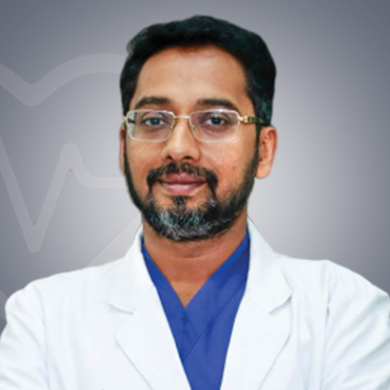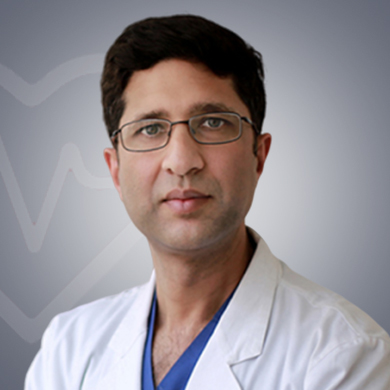
Dr A B Prabhu is one of the foremost Plastic Surgeon in Mohali, India. The clinician holds over 15 years of experience and is associated with Fortis Hospital.
Association and Memberships Dr. A B Prabhu is part of:
Qualifications :
Hospital Address :
Fortis Hospital Mohali, Sector 62, Sahibzada Ajit Singh Nagar, Punjab, India
Medical Expertise of Dr. A B Prabhu

Dr K M Kapoor is one of the top Plastic Surgeon in Mohali, India. The medical specialist holds over 17 years of experience and is associated with Fortis Hospital.
Please make sure to see your doctor using Telemedicine before you even board a flight
Following are some of the best Plastic Surgeons in other cities:
Following are some of the best clinics in Mohali, India with whom Plastic Surgeons are associated with:
A plastic surgeon is a licensed medical doctor trained in the restoration, reconstruction, or alteration of the human body. They mainly focus on reconstructive procedures and can see patients who have conditions like injuries, birth disorders, illnesses, or burns.
Many plastic surgeons decide to become cosmetic surgeons and do procedures to change a patient’s appearance. But not all plastic surgeons are cosmetic surgeons.
Plastic surgery is so much more than cosmetic surgery. While cosmetic surgery is probably the most visible aspect of plastic surgery, it is a comparatively small part of the specialty. Plastic surgery might be used not only to improve a person's look but also to restore a patient's appearance after an accident or recovery from cancer or another disease. A plastic surgeon may work on any area of the body.
Plastic surgeons do not own disease as cancer doctors do. They are trained to work all over the body on all types of diseases and frequently coordinate with other physicians in a multi-disciplinary group. Plastic surgeons achieve special skills, such as how to design a skin graft. They know how to transfer tissues from one part of the body to another, manage critical wounds, and use implantable materials like plastic or metal.
An aspiring candidate has to clear an entrance test to get admission into a medical college. Students can pursue Plastic Surgery courses after completing their Bachelor of Medicine and Bachelor of Surgery (MBBS) degree. This is a five-and-a-half-year course that includes basic medical education and training. All medical students have to complete this program irrespective of their area of specialization.
One must hold a Master of Surgery (MS) or doctor of osteopathy (D.O.) degree before they can undergo post-graduate training in plastic surgery. The MS or DO program usually takes 2-3 years to complete.
After you become a licensed physician, you have to complete a 3-year residency program in general surgery involving clinical rotations in various types of surgery. You can prefer to take a three-year residency in plastic surgery. You could complete a one-year fellowship program if you aim to specialize in a subspecialty of plastic surgery.
A plastic surgeon can treat the below-listed conditions:
Facial deformities
Cleft lip and palate
Ganglion cyst
Hand injuries
Head and neck cancers
Lip cancer
Lymphedema
Melanoma
Mouth cancer
Ameloblastoma
Breast cancer
Buerger's disease
Carpal tunnel syndrome
Cleft lip and cleft palate
Craniosynostosis
Nonmelanoma skin cancer
Orbital fracture
Ptosis (Drooping eyelid)
Suspicious breast lumps
Telangiectasia
Throat cancer
Tongue cancer
Tonsil cancer
Sarcoma
Skin blemishes
Soft palate cancer
Spider veins
Varicose veins
Vascular malformations
Wrinkles
Plastic surgery is a complex process and is also associated with certain risks. So, a plastic surgeon will completely evaluate your health status to know if you are fir for surgery. They will thoroughly examine your body and may order a few tests to have a complete idea about your current health status. A plastic surgeon does a thorough analysis of your diagnostic reports. If they find that your body is not fit for surgery, they will recommend certain medication in order to make your body ready for the procedure. Many surgeons order routine lab tests before you are admitted to the hospital or before certain outpatient procedures. The tests help find possible problems that might complicate surgery if not found and treated early. Some of the most common tests done before plastic surgery include:
Electrocardiogram
Chest X-rays
White blood count
Urinalysis
There are many reasons to consult a cosmetic surgeon. As people age, they may have wrinkles and sagging skin. Pregnancy can change a woman's body. Also, being overweight may hurt self-esteem. Cosmetic or plastic surgeons can help people who may want to improve their physical appearance.
You might also need to see a plastic surgeon about a physical problem. A primary care physician will refer you to them. If you wish to change your look, you need to see a cosmetic surgeon. A person needs to visit a plastic surgeon if he/she experiences below signs/symptoms:
Your first visit to a plastic surgeon would typically involve a question-answer session between you and the surgeon. When a patient visits a clinic for the first consultation, the surgeon will do a thorough examination. Then, the doctor will ask some questions and review the patient’s detailed medical history. This will include an assessment of the tests and scans the patient might have had beforehand. The surgeon can then develop a treatment strategy that suits the patient.
At the first appointment, the plastic surgeon will talk to the patient about treatment options. The oncologist will tell which ones are available at present, what the side effects may be, and how effective they are. Then the specialist will recommend a course and then suggest when the surgery could be performed.
Plastic surgery is gaining popularity each year. Below given are some most common plastic surgery procedures:
Top Medical Specialities in Mohali, India are: